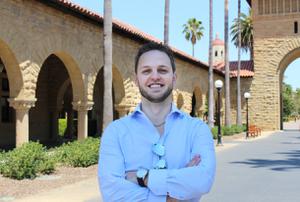ESP Biography
CHRIS MILLER, Stanford PhD Student & Former High School Teacher
|
Major: Neuroscience College/Employer: Stanford Year of Graduation: 2018 |

|
Brief Biographical Sketch:
Chris Miller is a second-year Neuroscience PhD student at Stanford School of Medicine with research interests in cognitive neuroscience and human neuroimaging. He finished his undergraduate education with a B.S. in Psychology and also completed the Neuroscience and Pre-Medical programs. He has published several academic papers, including one about obsessive-compulsive disorder that was highlighted by the New York Times as one of the “Year’s Best Ideas” in 2008. Following his undergraduate education, he taught high school science for three years at Carver Early College in downtown Atlanta through Teach for America, where his Biology students earned the designation of the highest-performing and highest-gains science classrooms in the Atlanta Public School District. His career plans involve becoming a college professor with both teaching and research components, while also remaining deeply involved in science education, community outreach, and social justice issues. In his personal time, he enjoys ballroom dancing, listening to hip-hop music, and playing frisbee with his dog Titan. Past Classes(Clicking a class title will bring you to the course's section of the corresponding course catalog)B3798: Brain Basics: How Our Brains Encode Who We Are in Splash Fall 2014 (Nov. 08 - 09, 2014)
This class will explore the basic structure and function of the nervous system and show students how the brain enables and encodes sensation, movement, language, memory, personality, thoughts, behaviors, and emotions--as well as tell the fascinating stories of how scientific pioneers made these remarkable discoveries.
B3799: Brain Signaling: How Neurons Conduct Action Potentials to Communicate in Splash Fall 2014 (Nov. 08 - 09, 2014)
This class will explore the process of how neurons send electrical signals throughout the brain and to the rest of the body by opening and closing ion channels and releasing chemical neurotransmitters. It will then use this new knowledge to briefly explain common medical problems ranging from seizures to depression and more.
B3800: Heart Physiology: How the Heart Works and What Can Go Wrong in Splash Fall 2014 (Nov. 08 - 09, 2014)
This class will explore the basic composition of blood, structure of the heart, and process of blood circulation--and then use this new knowledge to explain common medical issues such as blood types, heart rate, blood pressure, heart attacks, sickle-cell anemia, stroke, and more.
B3801: The Inner Life of a Cell: How Our Cells Use DNA to Give Us Everything We Need in Splash Fall 2014 (Nov. 08 - 09, 2014)
This class will explore the basic machinery inside of a typical human cell and how it uses this equipment to transform DNA into mRNA and proteins that are essential for everyday life, while also providing students with an appreciation of how cells accomplish these extraordinary functions--automatically and with amazing speed and accuracy.
B3803: The Reproductive System… And Important Issues for Science, Sex, and Health in Splash Fall 2014 (Nov. 08 - 09, 2014)
This class will explore the basic anatomy and physiology of the male and female reproductive systems--and then use this new knowledge to discuss issues important for personal health such as sexual intercourse, the menstrual cycle, birth control, embryonic development, and labor & delivery. Please note that this class will analyze somewhat graphic images and discuss mature topics--and will make every effort to do so both candidly and respectfully.
B3514: Brain Basics: How Our Brains Encode Who We Are in Splash! Spring 2014 (Apr. 12 - 13, 2014)
This class will explore the basic structure and function of the nervous system and show students how the brain enables and encodes sensation, movement, language, memory, personality, thoughts, behaviors, and emotions--as well as tell the fascinating stories of how scientific pioneers made these remarkable discoveries.
B3515: Evolution: Myths and Truths in Splash! Spring 2014 (Apr. 12 - 13, 2014)
This class will explore the most common misconceptions regarding evolution by natural selection and explain the basic mechanisms that allow species to change over time and adapt to their environments and the major events that have occurred from the origin of life leading up to the appearance of modern humans.
B3516: The Inner Life of a Cell: How Our Cells Use DNA to Give Us Everything We Need in Splash! Spring 2014 (Apr. 12 - 13, 2014)
This class will explore the basic machinery inside of a typical human cell and how it uses this equipment to transform DNA into mRNA and proteins that are essential for everyday life, while also providing students with an appreciation of how cells accomplish these extraordinary functions---automatically and with amazing speed and accuracy.
B3517: Cranial Nerves and Neurological Exams in Splash! Spring 2014 (Apr. 12 - 13, 2014)
This class will explore the basic structure and function of cranial nerves and then use this new knowledge to understand some of the diseases that result when they are damaged and how doctors check for them by performing some common neurological tests.
B3518: Heart Physiology: How the Heart Works and What Can Go Wrong in Splash! Spring 2014 (Apr. 12 - 13, 2014)
This class will explore the basic composition of blood, structure of the heart, and process of blood circulation---and then use this new knowledge to explain common medical issues such as blood types, heart rate, blood pressure, heart attacks, sickle-cell anemia, stroke, and more.
B3519: Action Potentials: How Neurons Use Electricity and Chemicals to Send Signals in Splash! Spring 2014 (Apr. 12 - 13, 2014)
This class will explore the process of how neurons send signals throughout the brain and to the rest of the body by opening and closing ion channels and releasing chemical neurotransmitters. It will then use this new knowledge to briefly explain common medical problems ranging from seizures to depression and more.
|
|
